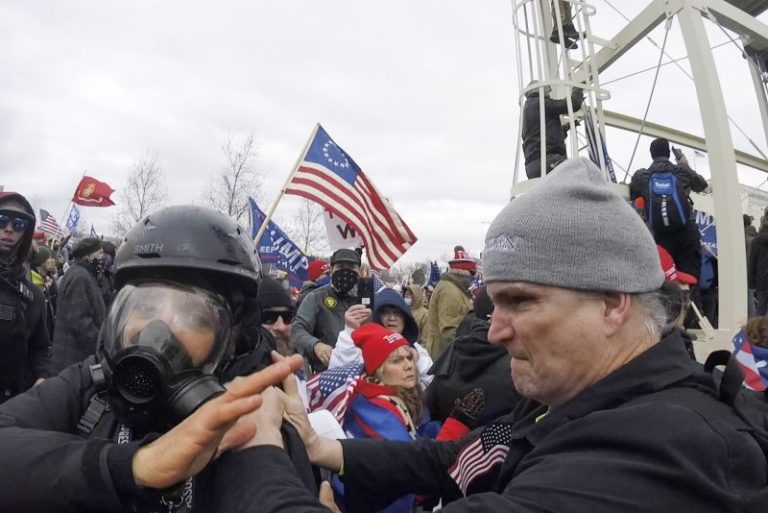Only in the abstract does Donald Trump’s argument about those arrested for participating in the Capitol riot make sense.
In a new video, Trump offers his support for those charged, arguing they’d been “treated unconstitutionally, in my opinion” by the government. Before claiming that the United States was becoming a communist nation (it is not), he made the intent of his statement obvious: the arrests were “the weaponization of the Department of Justice” — you know, just like how the Justice Department had been weaponized against him, just like how the investigations he faces are unwarranted.
But — as is also likely the case with the government’s probes of Trump — there is no grand conspiracy to roll up political opponents without cause, using the riot as a pretext. “I know how hard you’re working to get justice for people that are imprisoned right now,” Trump said, referring to the “Patriot Freedom Project,” the group for which the video was made. Most of those imprisoned, however, have either already faced justice or are awaiting trial on charges of assaulting law enforcement officers. Charges that in any other context, it’s safe to assume, Trump would be using as a lever to show his solidarity with the police.
Soon after the riot occurred, the effort to cast those arrested as political prisoners began. Hard-right members of Congress like Rep. Marjorie Taylor Greene (R-Ga.) have used subpar conditions in detention facilities as a way of arguing that detentions are unfair or punitive, failing to recognize the real problem: that detention facilities are often subpar for everyone. Usually, though, claims that the government is unfairly targeting the accused are simply efforts to cast the government as evil and the rioters as righteous. When Nick Fuentes, the antisemitic provocateur, challenged Trump’s handling of the riot cases at their infamous dinner last month, he was making a point about what sorts of actions should be protected, not worrying about judicial fairness.
After all, a review of ongoing detentions related to the Capitol riot makes obvious that the right’s presentation of the cases is often incomplete or hypersanitized.
It is tricky to determine who remains in detention. The Justice Department has a lengthy page of information about cases they’ve charged (900 in total) but limited information about the current status of the charged. Those 900 cases are illustrated below.
To determine who remains in detention, we turned to a website called “American Gulag,” one of a number of similar sites aimed at presenting the rioters sympathetically. (Each case typically includes information about aiding prisoners’ families and ways to get in contact with them or the court.) According to the site, there are 96 people who are in prison or jail related to their alleged activity on Jan. 6, 2021. (A call to the D.C. Department of Corrections, where most of the detainees are held, was not returned.)
Of those 96, at least eight have already been convicted by a judge or a jury. That includes the members of the Oath Keepers convicted on charges earlier this week.
This is an important consideration: yes, they’re in jail — but after having been judged to be guilty. This is not simply the government holding them in dank cells as punishment; this is punishment meted.
We can add to that group: 42 of those in detention have already pleaded guilty to charges. Often, that meant pleading guilty to charges of assault. This group, too, has already had justice administered — and, when we add in the convictions — it constitutes more than half of detainees.
The rest of those who remain in detention are awaiting trial. In four cases, that’s because they’d been released on bond or on their own recognizance but then violated the terms of their release.
In most of the other cases, the person in detention is charged with “assaulting, resisting, or impeding certain officers” or “inflicting bodily injury on certain officers” — in other words, assaulting or attacking law enforcement. Four of those in detention are members of the Proud Boys, charged with conspiracy (and, in at least one case, with assault). Note that these figures do not include Proud Boys leader Enrique Tarrio, who was not present at the Capitol on the day of the riot.
There are four others who are awaiting trial on other charges. In two cases, the detainees are charged with “violent entry and disorderly conduct in a Capitol building.” In another, the detainee is charged with threatening a federal officer.
The question then becomes: does Trump think these people should be freed? Does he think that the charges were contrived against all 34 of those who the government claims had assaulted or resisted police officers? Does he believe that the four people whose bail was revoked are being treated “unconstitutionally?”
What’s obvious, when reviewing the record, is that one’s view of the detainees depends on how one perceives the events of Jan. 6, 2021. If you think the riot was a protest that got out of hand, that maybe involved a little scuffling, you’re likely to be more sympathetic to those who remain in jail or prison. If, on the other hand, you view the riot as something more significant, that there ought to be repercussions when some 140 police officers are attacked by a violent mob, you might view these cases differently.
Then there are those whose interest is in casting the Justice Department as politically biased so that any future charges might be considered with skepticism. For the former president, perhaps the only member of that group, the downside of granting full amnesty to dozens of people who beat police officers is secondary to the political and legal benefits of promoting the idea that everyone targeted with federal charges is probably innocent.

